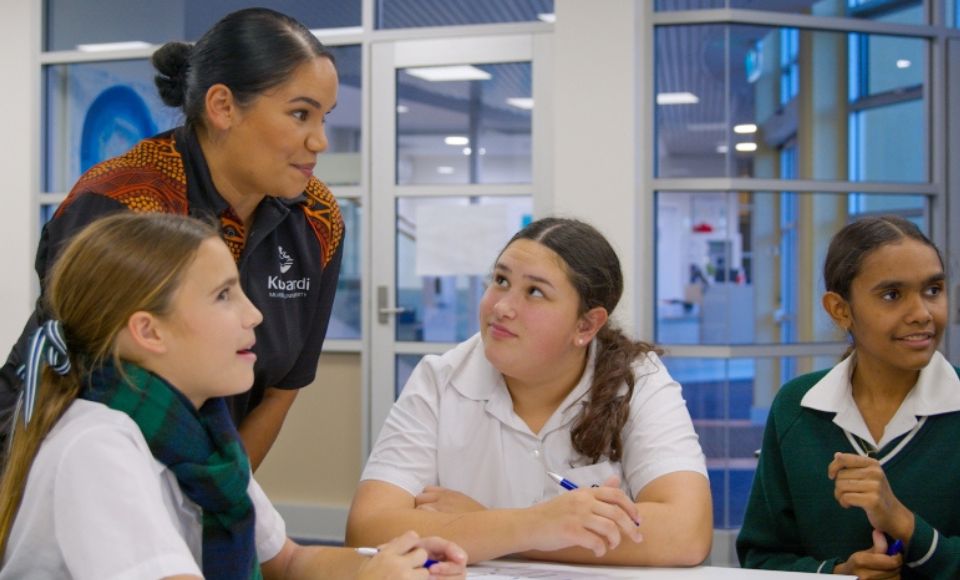Return to Our Story page
News
K-Track and Kulbardi - Continuing a long tradition of learning and storytelling

In 1988, the Kulbardi Aboriginal Centre at Murdoch University opened its doors, and more than three decades later, it continues to celebrate Aboriginal excellence in higher education.
Kulbardi’s goal is to increase Aboriginal and Torres Strait Islander student participation in higher education by supporting students throughout their entire journey in education.
In 2022, Kulbardi celebrated its 500th graduate, a monumental milestone in recognising the Centre’s impact. The Centre has a driven and hardworking group of staff that works to support and empower First Nations students.
This includes long-term staff member Terri McCann, who is celebrating more than 30 years at Murdoch, and has supported many students within Kulbardi during this time.
With passionate teachers, a strong sense of community, and culture at the forefront, Kulbardi has gone from strength-to-strength and continues to inspire students from all walks of life.
Named by respected Noongar Elder Ralph Winmar, Kulbardi means ‘magpie’ - an important symbol of healing and care in Noongar cosmology.
At the heart of Kulbardi is the idea that education is freedom, and the people you meet, ideas you engage with and the doors you open through education can transform lives.
To put this mission statement into action, the Centre introduced ‘K-Track’, a free alternative entry pathway which teaches students core skills and helps them qualify for undergraduate entry.
Education is freedom
Through K-Track, countless Aboriginal students have soared to success, and many have returned to inspire the next generation.
Aaron Taylor was going through the Drug Court Program after battling a 20-year drug addiction, when a chance encounter reconnected him with his uncle Professor Len Collard.
Professor Collard was working at Murdoch during this time, and he suggested that Aaron reach out to Kulbardi.
Little did Aaron know at the time, this decision would lead him on an incredible journey, culminating in an academic excellence award and the role of Kulbardi’s Lead Facilitator.
Murdoch University’s Dean of Indigenous Knowledges Jenna Woods also treaded the boards at Kulbardi, enrolling in the bridging course at 18.
A young mum caring for her own mother who was battling cancer, Ms Woods arrived at Murdoch with big dreams.
She achieved those dreams while balancing life, motherhood and more, and achieved both a bachelor’s and master’s degree.
Pro Vice Chancellor First Nations Chanelle van den Berg is one of Murdoch’s most notable figures. She said her own time at Kulbardi was ‘transformational’, and that her dream was to help others realise their potential.
Pro Vice Chancellor van den Berg enrolled as a mature-aged student after spotting an article about Kulbardi while she was at work.
During her studies, she discovered a passion for education, and implementing programs to increase retention and graduation rates for Aboriginal students.
Pro Vice Chancellor van den Berg’s grandmother, Dr Rosemary van den Berg, previously taught at Kulbardi.
Dr van den Berg was the first Aboriginal person in WA to be awarded a PhD, and she was a great inspiration in her granddaughter’s journey, as well as the journeys of many other students.
Deadly dreams for deadly kids
Wanting to reach more Indigenous students earlier in their lives, Sharna Walley, Senior Training Manager First Nations, started the Deadly Dreaming program.
After researching the barriers to young people finishing year 12, Ms Walley set out to help break them down.
“What we found was they were feeling isolated, they were experiencing racism, they had a lack of access to role models, and university wasn’t something they had all seen in their community,” she said.

“So, we said let’s start teaching kids about those things… Let's talk about racism. Let's have a conversation about how to overcome stereotypes to break through those barriers. Let’s teach them about Aboriginal success.”
The workshops culminate in a celebration of young people’s Aboriginality, where hundreds of students come together on campus to connect, recognise their culture, and explore whether university might be the next step in their journey.
This is just one of the many ways that the team at Kulbardi continues to inspire and mentor the next generation, while celebrating the traditions of learning and storytelling that have been part of Aboriginal culture for tens of thousands of years.
Dreaming into the future
The future of Kulbardi is bright and deadly, with ground-breaking research being conducted within the Aboriginal Culture Education and Equity (ACEE) lab, led by Dr Bep Uink, and passionate associate lecturer and Centre manager Ashah Tanoa at the helm. The focuses from the ACEE research includes racism among adolescents and youth through the RAYYS project. Kulbardi also supports many Higher Degree by Research students.
In 2022, Ms Tanoa won the WAIER-Fogarty Foundation Postgraduate Student Research Prize for her research, ‘“Let’s yarn about uni”: Conversations around the Indigenous student university experience’.
The research was centred around ways to support Indigenous student success to help them thrive in higher education.
Ms Tanoa wrote in her thesis that the first year of university is a vulnerable time for all students, especially those from non-traditional backgrounds, and there is limited data around why students leave.
With her research firmly cemented in student support and success, Ms Tanoa will carry-on Kulbardi’s history of culture, learning and storytelling.
News
K-Track and Kulbardi - Continuing a long tradition of learning and storytelling
Posted on
Topics
